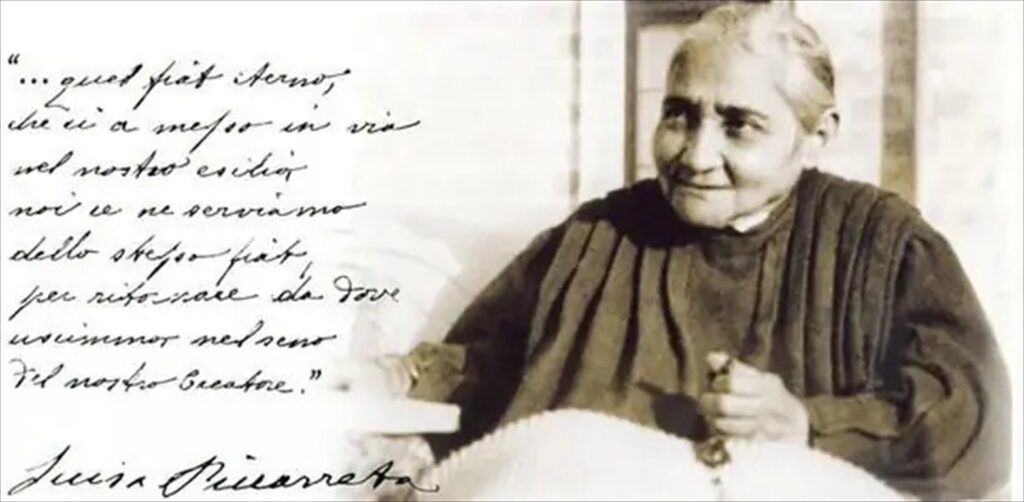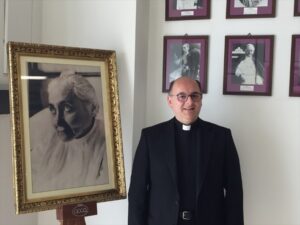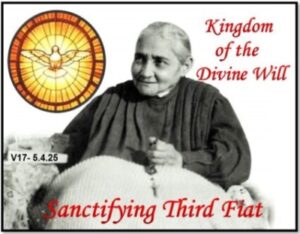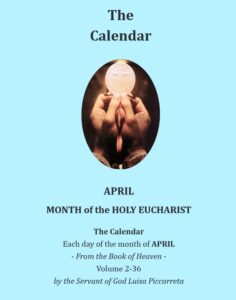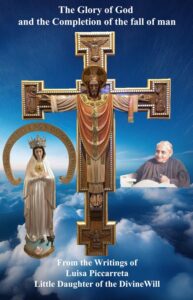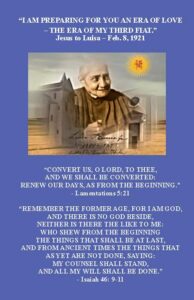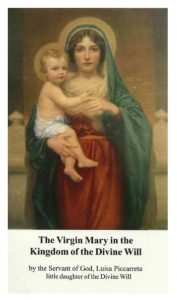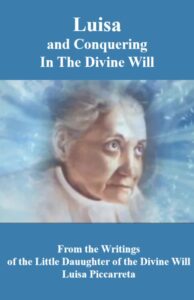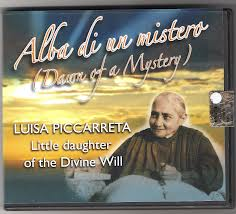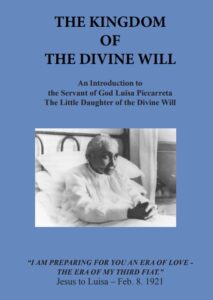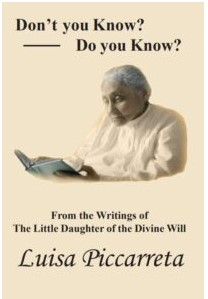- 1994: The Vatican gave “Non Obstare” to Mons. Carmelo Cassati, Archbishop of Trani-Barletta-Bisceglie to start the cause of beatification and Luisa Piccarreta automatically became a Servant of God.
(Before a bishop can begin an investigation of any person’s Cause of Beatification he must first obtain permission from the Vatican, otherwise known as the Holy See. The Congregation for the Causes of Saints grants this permission on behalf of the Holy See only after consulting all the other appropriate Curial offices of the Vatican to determine whether there are any objections to the candidate’s cause proceeding. Following this requirement the Most Reverend Carmelo Cassati, Archbishop of Trani-Barletta-Bisceglia, the archdiocese in which Luisa died, sought permission from the Vatican to proceed with her Cause. By way of an official letter dated February 24, 1994, the Congregation for the Cause of Beatification of Saints declared, “on the part of the Holy See the Non Obstare for the opening of the Cause of Beatification of the Servant of God, Luisa Piccarreta.” )
- November 20, 1994: The cause of beatification was opened officially on the Feast of Christ the King.
- January 1996: Then Cardinal Ratzinger (now Pope Benedict XVI) released 34 volumes of the Book of Heaven to Archbishop Cassati as part of the protocol for process of Luisa’s Cause of Beatification.
- March 1997: On the occasion of the 50th anniversary of Luisa’s death, it was announced publicly that the Tribunal Responsible for Luisa’s Cause had determined unanimously that her life was one of heroic virtue and that her mystical experiences were authentic.
- October 28, 2005: The cause of beatification was officially concluded at the diocesan phase.
- November 7, 2005: All the official documents were transferred to the Vatican.
- March 7, 2006: Congregation for the Causes of Saints opened the box (started the cause) officially.
- 2008: Congregation for the Causes of Saints appointed two independent, highly qualified theologians – Fr. Antonio Resta, President of the Pontifical Theological Seminary in Italy; Fr. Cosimo Reho, dogmatic theologian – to review Luisa’s writings.
- End of 2009: one of two theologians gave his positive judgment.
- July 19, 2010: the other theologian gave his positive judgment.
“Positive judgment” means that there are no teachings in Luisa’s writings contrary to Catholic Faith and Moral. It also means that the Church recognizes the legitimacy and authenticity of her writings.
Significance of Imprimatur
- Ecclesiastical permission, expressed only with the word imprimatur, means that the work is free from errors regarding Catholic faith and morals.
- Approval granted by competent authority shows that the text is accepted by the Church or that the work is in accordance with the authentic doctrine of the Church (can. 661).
- As Cardinal Joseph Ratzinger explained when he was head of the Congregation of the Doctrine of the Faith:
“Ecclesiastical approval of a private revelation has three elements: the message contains nothing contrary to faith or morals; it is lawful to make it public; and the faithful are authorized to accept it with prudence.”
- Although the Imprimatur and Nihil Obstat may be given by the local bishop for his diocese, one ought not to lose sight of the fact that these official seals, though given locally and within one diocesan jurisdiction, customarily transcend juridical boundaries by virtue of episcopal collegiality and their acceptance by other bishops the world over.
- The fact that bishops can issue Imprimaturs is a significant sign that they are acts of the Magisterium. (The archbishop of Trani gave his handwritten Imprimatur directly on those original manuscripts of Luisa.)
What is Church’s stance on Luisa Piccarreta?
- Since she has not yet been declared “Venerable” there is nothing that yet amounts to formal Vatican “approval” of Luisa’s writings.
- Vatican’s current, official position on Luisa’s sanctity and her writings is neutral. The Catholic Church does not yet officially give them her full “approval,” but neither does she “condemn” them.
- The Archbishop promoting Luisa’s Cause is doing so in strict accord with Canon Law and in complete harmony with Rome. This includes a careful and comprehensive review of Luisa’s writings by competent, independent experts in theology.
- In summary, the record is entirely clear concerning the writings of Luisa. Anyone can read them with a clear conscience and be completely at peace.
Cardinal Jose Savaiva Martins, Prefect Emeritus of the Congregation for the Causes of Saints – in his Preface for the Vatican biography, The Sun of My Will, by Maria Rosaria Del Genio, stated:
“From her continual contemplation of Jesus’ passion, Luisa is led to conform herself to Christ, to the point of offering herself with Him to the Father for the benefit of all humanity. She learns from the book of the Cross that the Will of God is not about carrying out orders received, but a gift in which one must place, before all else, the center of one’s life. This “living in the Divine Will” is the actual way in which the Son Jesus lived on earth, bringing here with him the life of Heaven.”
Cardinal Pietro Palazzini, Prefect of the Congregation for the Causes of Saints
During the various meetings as I [Padre Bucci] had with Cardinal Palazzini, he confided to me that he learned about Luisa Piccarreta and her spirituality by his dear teacher and friend, Cardinal Cento. Cardinal Palazzini referred to her as “The dear Luisa.”
His thoughts on the Servant of God were impressed in my mind. He said: “The raising of the dear Luisa to the honors of the altar would be a benefit for the whole Church, because of the novelty and depth of her message on the Divine Will, which is a doctrine that has always been accepted by the Church.”
St. Annibale Maria di Francia, Luisa’s extraordinary Confessor for 17 years, appointed by the Church to be the censor of her writings – also, found nothing contrary to Catholic faith or morals and granted the “Nihil Obstat” to the first 19 of her Volumes in 1926, shortly before his death. Archbishop Joseph Leo granted the Imprimatur to those Volumes also in 1926. – “He (Jesus) calls (Luisa) the littlest one that He found on earth, the instrument of a Mission so Sublime that no other can be compared to it – that is, the Triumph of the Divine Will upon the whole earth, in conformity with what is said in the ‘Our Father’: Fiat Voluntas Tua Sicut in Caelo et in Terra.”
Excerpt from Letter 2 to the Servant of God Luisa Piccarreta – Messina, June 20, 1924
“These are writings that must now be made known to the world. I believe they will produce great good. For as sublime as this science of the Divine Will is, so do these writings of divine dictation present it, clearly and limpidly. In my opinion, no human intellect would have been able to form them.”
Padre Bernardino Giuseppe Bucci, OFM – Promoter of the Faith and member of the Ecclesiastical Diocesan Tribunal for the Cause of Beatification of the Servant of God Luisa Piccarreta; Author of many books on the life of Luisa; co-founder of the Association of the Divine Will
“God calls one creature to be the first in this event, the first fruit of a New Era – His little daughter in the Divine Will, the newborn of the Divine Will: Luisa Piccarreta, called by all, with prophetic voice, ‘Luisa la Santa’.”
“In the new millennium, the world and the Church are going to focus on Luisa Piccarreta and the Divine Will.” “Luisa is not just a Saint… She is The Saint.” “All the world will become Catholic. Luisa is the starting point… always remember this.”
“But when He Comes, the Spirit of Truth, He shall Guide you to All Truth.
He shall not Speak on His Own, but He shall Speak what He Hears
and shall Declare to you the Things that are Coming.” – John 16:13

